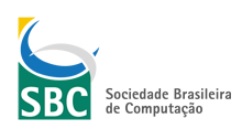TrustE - An Emotional Trust Model for Agents
Resumo
Trust and Reputation has been proposed in the Multiagent System area as a way for assisting agents to select good partners in order to increese the well successed interactions between agents. As well as trust, agent emotions has been studied with the intention to turn actions and reactions of the agents more human like. In this paper, we present a trust emotional based model. This proposal is an hibrid model that congregates a mathematical and a symbolical models for capturing the complexity of the reasoning. Quantitative and qualitative evalutations are mixed throught the incorporation of some emotional flavors in the trust evaluation.Referências
E. Ostrom, “A behavioral approach to the rational choice theory of collective action: Presidential address, american political science association, 1997,” American Political Science Review, pp. 1–22, 1998.
J. Sabater and C. Sierra, “Regret: reputation in gregarious societies,” in Proceedings of the fifth international conference on Autonomous agents. ACM, 2001, pp. 194–195.
W. Teacy, J. Patel, N. Jennings, and M. Luck, “Travos: Trust and reputation in the context of inaccurate information sources,” Autonomous Agents and Multi-Agent Systems, vol. 12, no. 2, pp. 183–198, 2006.
J. Sabater and C. Sierra, “Review on computational trust and reputation models,” Artificial Intelligence Review, vol. 24, no. 1, pp. 33–60, 2005.
T. Dong-Huynha, N. Jennings, and N. Shadbolt, “Fire: An integrated trust and reputation model for open multi-agent systems,” in ECAI 2004: 16th European Conference on Artificial Intelligence, August 22-27, 2004, Valencia, Spain, vol. 110. Ios Pr Inc, 2004, p. 18.
G. Lu, J. Lu, S. Yao, and Y. Yip, “A review on computational trust models for multi-agent systems,” The Open Information Science Journal, vol. 2, pp. 18–25, 2009.
S. Marsh, “Formalising trust as a computational concept,” Ph.D. dissertation, Department of Mathematics and Computer Science, University of Stirling, 1994.
G. Zacharia, A. Moukas, and P. Maes, “Collaborative reputation mechanisms for electronic marketplaces,” Decision Support Systems, vol. 29, no. 4, pp. 371–388, 2000.
B. Yu and M. Singh, “Searching social networks,” in Proceedings of the second international joint conference on Autonomous agents and multiagent systems. ACM, 2003, pp. 65–72.
E. Lorini, “Agents with emotions: a logical perspective,” ALP Newsletter, vol. 12, no. 2-3, 2008.
A. Ortony, G. Clore, and A. Collins, The cognitive structure of emotions. Cambridge university press, 1990.
B. R. Steunebrink, M. Dastani, and J.-J. C. Meyer, “Towards a quantitative model of emotions for intelligent agents,” in Proceedings of the 2nd Workshop on Emotion and Computing-Current Research and Future Impact, Osnabrück, Germany, 2007.
B. Steunebrink, M. Dastani, and J. Meyer, “The occ model revisited,” in Proceedings of the 4th Workshop on Emotion and Computing, vol. 65, 2009, pp. 2047–2056.
B. R. Steunebrink, M. Dastani, and J. Meyer, “A logic of emotions for intelligent agents,” in Proceedings of the National Conference on Artificial Intelligence, vol. 22, no. 1. Menlo Park, CA; Cambridge, MA; London; AAAI Press; MIT Press; 1999, 2007, p. 142.
J. Sabater and C. Sierra, “Regret: reputation in gregarious societies,” in Proceedings of the fifth international conference on Autonomous agents. ACM, 2001, pp. 194–195.
W. Teacy, J. Patel, N. Jennings, and M. Luck, “Travos: Trust and reputation in the context of inaccurate information sources,” Autonomous Agents and Multi-Agent Systems, vol. 12, no. 2, pp. 183–198, 2006.
J. Sabater and C. Sierra, “Review on computational trust and reputation models,” Artificial Intelligence Review, vol. 24, no. 1, pp. 33–60, 2005.
T. Dong-Huynha, N. Jennings, and N. Shadbolt, “Fire: An integrated trust and reputation model for open multi-agent systems,” in ECAI 2004: 16th European Conference on Artificial Intelligence, August 22-27, 2004, Valencia, Spain, vol. 110. Ios Pr Inc, 2004, p. 18.
G. Lu, J. Lu, S. Yao, and Y. Yip, “A review on computational trust models for multi-agent systems,” The Open Information Science Journal, vol. 2, pp. 18–25, 2009.
S. Marsh, “Formalising trust as a computational concept,” Ph.D. dissertation, Department of Mathematics and Computer Science, University of Stirling, 1994.
G. Zacharia, A. Moukas, and P. Maes, “Collaborative reputation mechanisms for electronic marketplaces,” Decision Support Systems, vol. 29, no. 4, pp. 371–388, 2000.
B. Yu and M. Singh, “Searching social networks,” in Proceedings of the second international joint conference on Autonomous agents and multiagent systems. ACM, 2003, pp. 65–72.
E. Lorini, “Agents with emotions: a logical perspective,” ALP Newsletter, vol. 12, no. 2-3, 2008.
A. Ortony, G. Clore, and A. Collins, The cognitive structure of emotions. Cambridge university press, 1990.
B. R. Steunebrink, M. Dastani, and J.-J. C. Meyer, “Towards a quantitative model of emotions for intelligent agents,” in Proceedings of the 2nd Workshop on Emotion and Computing-Current Research and Future Impact, Osnabrück, Germany, 2007.
B. Steunebrink, M. Dastani, and J. Meyer, “The occ model revisited,” in Proceedings of the 4th Workshop on Emotion and Computing, vol. 65, 2009, pp. 2047–2056.
B. R. Steunebrink, M. Dastani, and J. Meyer, “A logic of emotions for intelligent agents,” in Proceedings of the National Conference on Artificial Intelligence, vol. 22, no. 1. Menlo Park, CA; Cambridge, MA; London; AAAI Press; MIT Press; 1999, 2007, p. 142.
Publicado
26/05/2013
Como Citar
BITENCOURT, Guilherme K.; SILVEIRA, Ricardo A.; MARCHI, Jerusa.
TrustE - An Emotional Trust Model for Agents. In: WORKSHOP-ESCOLA DE SISTEMAS DE AGENTES, SEUS AMBIENTES E APLICAÇÕES (WESAAC), 7. , 2013, São Paulo/SP.
Anais [...].
Porto Alegre: Sociedade Brasileira de Computação,
2013
.
p. 85-90.
ISSN 2326-5434.
DOI: https://doi.org/10.5753/wesaac.2013.33174.



